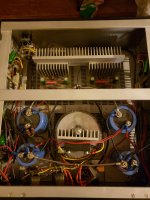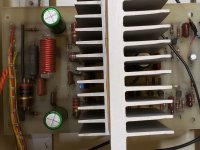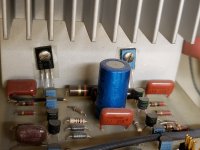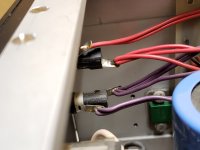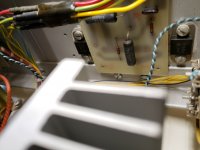Hi everyone,
I bought this locally to reuse the case. However, the insides seem to have been made with care. I am wondering if I can resurrect this.
From the previous owner, some fuses blew (there are 7). They were not the original DIYers and did not want to fix this. Left channel power rail fuses seem to have blown now. I have not turned it on yet.
The input stage has JE350, JE340, 1 pair per channel.
The output stage has 1 pair of K344, and 1 pair of J100, per channel.
My searches have not turned up anything. I attached a couple of pictures. As far as my experience, I have built a Pass DIY and a Zen Mod amplifier. I have also fixed a Klipsch promedia with a blown output stage.
Before I try tracing schematics, Does any of this sound familiar? What amp could this be? Any links or suggestions ?
Thanks in advance for any help.
I bought this locally to reuse the case. However, the insides seem to have been made with care. I am wondering if I can resurrect this.
From the previous owner, some fuses blew (there are 7). They were not the original DIYers and did not want to fix this. Left channel power rail fuses seem to have blown now. I have not turned it on yet.
The input stage has JE350, JE340, 1 pair per channel.
The output stage has 1 pair of K344, and 1 pair of J100, per channel.
My searches have not turned up anything. I attached a couple of pictures. As far as my experience, I have built a Pass DIY and a Zen Mod amplifier. I have also fixed a Klipsch promedia with a blown output stage.
Before I try tracing schematics, Does any of this sound familiar? What amp could this be? Any links or suggestions ?
Thanks in advance for any help.
Attachments
Last edited:
It seems to use a few carbon composition resistors which is an oddity. It either dates it to 40+ years ago or they were used in the belief they sound better.
Don't power it up without using a bulb tester would be my advice.
Without circuit details it is going to be an uphill struggle I'm afraid. Those small power transistors are common MJE 340/350 complementary pairs. It possibly uses a fully symmetrical type input configuration of the type that is popular today.
Don't power it up without using a bulb tester would be my advice.
Without circuit details it is going to be an uphill struggle I'm afraid. Those small power transistors are common MJE 340/350 complementary pairs. It possibly uses a fully symmetrical type input configuration of the type that is popular today.
I would guess it's based on the typical "Hitachi application" for their power mosfets. MJE340/350 are being used as drivers for the output MOSFETs, and I can see MPS8099 in there which is probably the LTP, and what looks like MPSA05/55 for the VAS stage
First thing to do is pull and check those output MOSFETs, if they have failed then there's not much point doing anything else
First thing to do is pull and check those output MOSFETs, if they have failed then there's not much point doing anything else
2SJ100, 2SK344 and 2SJ99, 2SK343 have been sold as complementary
pairs by Hitachi. The spelling in post 1 must be in error.
For comparison it may be useful to have a look at the schematic of Bowers
and Wilkins MPA-1 power amp, see picture attached.
This circuit is close enough to most what has been done to mistreat innocent
semiconductors in the Eighties and may be straightly applicable here.
pairs by Hitachi. The spelling in post 1 must be in error.
For comparison it may be useful to have a look at the schematic of Bowers
and Wilkins MPA-1 power amp, see picture attached.
This circuit is close enough to most what has been done to mistreat innocent
semiconductors in the Eighties and may be straightly applicable here.
Attachments
if you can take different angles of photos of the fiberglass amp board with a torch lit up under it, (the copper side photo is also needed). we might be able to trace the circuit through the transparent board.
Thanks for the responses everyone.
I have a DBT. I'll disconnect as much as possible and check power supply with that.
I'll also check output fets.
The rest are probably contingent on how those go.
I have a DBT. I'll disconnect as much as possible and check power supply with that.
I'll also check output fets.
The rest are probably contingent on how those go.
- Home
- Amplifiers
- Solid State
- Help with unknown DIY amp
